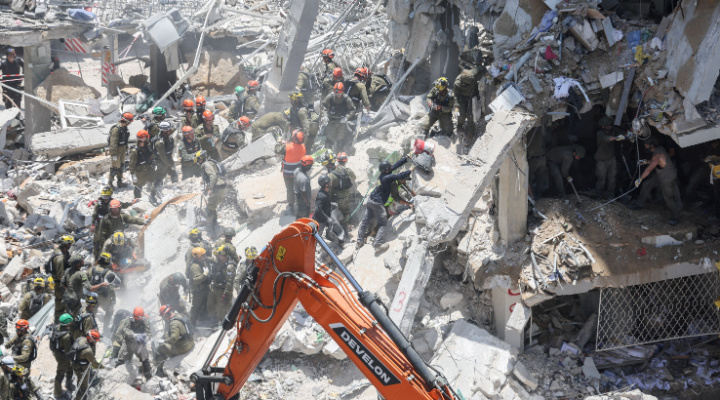Rescue personnel work at an impact site following a missile attack from Iran, in Bat Yam, Israel, June 15, 2025. Photo: REUTERS/Ronen Zvulun
The search continued Tuesday for a woman still unaccounted for after Iran’s deadliest strike on central Israel, which devastated residential neighborhoods in Bat Yam early Sunday. As recovery crews combed through the ruins, a small moment of relief came Tuesday when Home Front Command and police teams pulled two puppies alive from a damaged apartment.
The dogs had been trapped inside since the strike and were transferred to Bat Yam Municipality’s veterinary services for medical care. Authorities are now attempting to locate the evacuated owners to reunite them with the surviving pets.

Bat Yam Mayor Zvika Brut with the puppies found in the rubble caused by Iranian strike in the central coastal city of Bat Yam. Photo: Vadim Action
The strike, which flattened parts of the densely populated coastal city just south of Tel Aviv, killed eight people and wounded 180 others. Among the dead were Efrat Saranga, 44; Bella Ashkenazi, 90; Michael Nahum, 61; Meir Voknin, 53; and four Ukrainian nationals who had relocated to Israel after Russia’s invasion of their homeland.
The Iranian missile, estimated to weigh 500 kilograms, obliterated dozens of buildings in Bat Yam. According to local officials, roughly 75 structures sustained varying degrees of damage, some reduced entirely to rubble. Residents returned to scenes of total destruction, their homes unrecognizable.
“It’s a huge mess, debris everywhere, shrapnel inside the house, and we weren’t even directly hit,” Boris, a local resident, told The Algemeiner. He said authorities had not allowed him to retrieve any personal belongings from his apartment, adding that he had no home insurance. “Even if I did, most policies don’t cover terror attacks unless you add special terrorism coverage,” he said.
Under Israeli law, the Property Tax Authority is responsible for compensating victims of war or terrorism for structural damage. However, coverage for the contents of homes is limited and typically excludes valuables like jewelry or art.
“I’ve lost everything, but I’m alive, and that’s what matters,” Boris said.
Chana Ohana, 77, another resident of the devastated area, described the terror as the missiles struck. “The booms were so loud, I was sure that was the end of me,” she said. Displaced from her home, she said she had nowhere to go. “The police are supposed to arrange a hotel, but nothing yet. My son will come for me, but his apartment is tiny, and there’s no bomb shelter nearby.”
The barrage on Bat Yam marked one of the most lethal Iranian assaults since hostilities between the two countries escalated last week. Iranian strikes have targeted civilian areas across Israel following Israel’s attack on Tehran’s nuclear infrastructure Friday, in what Israeli officials described as a preemptive move to halt Iran’s nuclear weapons program.
Prime Minister Benjamin Netanyahu visited the scene of the strike. “We are here because we are in the middle of an existential struggle, that all Israeli citizens understand,” Netanyahu said. Standing amid the debris, he warned of the stakes involved. “Think about what would happen if Iran had a nuclear weapon to drop on Israeli cities. Think about what would happen if Iran had 20,000 such missiles. Not one, but 20,000. An existential threat to Israel,” he said. “But we are on the way to victory,” he concluded.

Israeli Prime Minister Benjamin Netanyahu speaks at the site of the Iranian strike in Bat Yam. Photo: GPO
Since the devastation in Bat Yam, a series of fresh Iranian missile strikes have hit Israel in the ensuing days. In an aerial barrage overnight Sunday, missiles hit residential buildings in Tel Aviv, Bnei Brak, Petah Tikva, and Haifa. In central Tel Aviv, two missiles struck near the US Embassy damaging almost a kilometer of property and injuring dozens. In Petah Tikva, four people were killed; three died in Haifa, where an Iranian missile blast damaged the Bazan oil refinery, triggering a fire and temporarily shutting down part of its operations, the ripple effects of which are being felt in the regional energy market. Global oil prices temporarily surged to the mid-$70s per barrel before stabilizing.
Israel, meanwhile, has escalated its campaign deep into Iran. On Tuesday the Israeli Defense Forces (IDF) said it had launched a major airstrike on a command center in central Tehran, killing Ali Shadmani, Iran’s newly appointed wartime chief of staff. Shadmani, an aide to Supreme Leader Ali Khamenei who held his post for three days before being killed, succeeded Mohammad Bagheri, who was killed in an Israeli strike along with IRGC commander-in-chief Hossein Salami on Friday.
Israel also struck additional nuclear and military infrastructure across Tehran, including sites tied to the Islamic Revolutionary Guard Corps (IRGC) and missile production, triggering mass evacuations of Tehran.
The post As Israel Pounds Tehran, Central Israeli City Still Searches for Missing From Iran’s Deadliest Strike first appeared on Algemeiner.com.
Click this link for the original source of this article.
Author: Debbie Weiss
This content is courtesy of, and owned and copyrighted by, https://www.algemeiner.com and its author. This content is made available by use of the public RSS feed offered by the host site and is used for educational purposes only. If you are the author or represent the host site and would like this content removed now and in the future, please contact USSANews.com using the email address in the Contact page found in the website menu.








